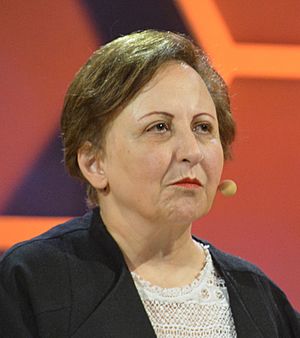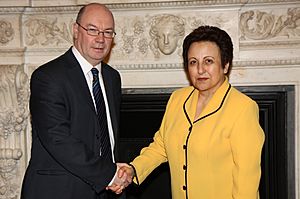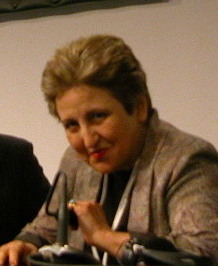Shirin Ebadi facts for kids
Quick facts for kids
Shirin Ebadi
|
|
|---|---|
| شيرين عبادى | |

Ebadi in 2017
|
|
| Born | 21 June 1947 Hamadan, Iran
|
| Nationality | Iranian |
| Alma mater | University of Tehran |
| Occupation |
|
| Known for | Defenders of Human Rights Center |
| Awards | Rafto Prize (2001) Nobel Peace Prize (2003) JPM Interfaith Award (2004) Legion of Honour (2006) |
| Signature | |
Shirin Ebadi (born June 21, 1947) is an Iranian lawyer, writer, and former judge. She is famous for founding the Defenders of Human Rights Center in Iran. In 2003, she won the Nobel Peace Prize for her work to improve human rights. She focused on the rights of women, children, and refugees.
Ebadi was the first Iranian and the first Muslim woman to receive this famous award. Because of her work, she had to leave Iran. She has lived in London since 2009.
Contents
Early Life and Career
Shirin Ebadi was born in Hamadan, Iran, to a well-educated family. Her father was a professor of law. When she was a baby, her family moved to Tehran, the capital of Iran.
In 1965, she began studying law at the University of Tehran. After graduating in 1969, she passed exams to become a judge. She was one of the first female judges in Iran's history. By 1975, she became the first woman to lead the city court of Tehran.
However, after the Iranian Revolution in 1979, new rules stopped women from being judges. Ebadi was removed from her position and given a job as a clerk in the same court she once led. She was not allowed to practice law until 1993. During this time, she wrote many books and articles.
Work as a Human Rights Lawyer
Once she could work as a lawyer again, Ebadi became a powerful voice for justice. She often took on cases for free, which is called pro bono work. She defended people who were treated unfairly by the government.
She also worked to protect women and children. One famous case involved a young girl named Arian Golshani. Arian was badly mistreated and died. Ebadi used this case to show problems with Iran's laws about which parent gets to keep a child after a divorce.
Ebadi also helped write a new law to protect children from physical harm. The Iranian parliament passed this law in 2002. She started two organizations to help people: the Society for Protecting the Rights of the Child (SPRC) and the Defenders of Human Rights Center (DHRC).
Political and Religious Beliefs
In her book Iran Awakening, Ebadi explains her beliefs. She says that her religion, Islam, supports equality and democracy. She believes that unfair rules against women are made by people, not by religion itself.
Ebadi loves her country, Iran. She believes that any changes in Iran should happen peacefully and come from the Iranian people, not from other countries.
She has also spoken about Iran's nuclear program. While she once saw it as a source of national pride, she later said that the safety and well-being of the Iranian people are more important.
Winning the Nobel Peace Prize
On October 10, 2003, Shirin Ebadi won the Nobel Peace Prize. The Nobel Committee called her a "courageous person" who never gave up, even when she was threatened. The award recognized her important work for democracy and human rights.
The news surprised many people around the world. When she returned to Iran, thousands of supporters greeted her at the airport. However, some government officials in Iran were not happy. They felt the award was political.
In her acceptance speech, Ebadi said that Islam is compatible with human rights and democracy. She also criticized the foreign policy of the United States. She was the first Iranian and the first Muslim woman to win the prize.
In 2009, it was reported that Iranian authorities took her Nobel medal from her bank's safe deposit box. The Iranian government denied this.
Life After the Nobel Prize

After winning the Nobel Prize, Ebadi continued her work. She traveled the world, giving lectures and teaching about human rights. She also continued to defend people in Iran who were arrested for their beliefs.
In 2006, she helped create the Nobel Women's Initiative with five other female Nobel laureates. This group works together to promote peace, justice, and equality for women everywhere.
Facing Threats
Ebadi's work put her in danger. She received threats against her and her family. In 2008, the Iranian government shut down her human rights office in Tehran.
She had to leave Iran in 2009 and has lived in exile ever since. Even from outside Iran, she continues to speak up for the rights of the Iranian people. She has called for the release of political prisoners and has criticized the government's human rights record.
Awards and Recognition
Besides the Nobel Peace Prize, Shirin Ebadi has received many other awards and honorary degrees from universities all over the world. These honors recognize her brave and tireless work for human rights.
- Rafto Prize (2001)
- Légion d'honneur (2006), a high honor from France
- International Democracy Award (2004)
- Listed as one of the "100 most powerful women in the world" by Forbes magazine (2004)
Published Books
- Iran Awakening: One Woman's Journey to Reclaim Her Life and Country (2007)
- Refugee Rights in Iran (2008)
- The Golden Cage: Three brothers, Three choices, One destiny (2011)
- Until We Are Free (2016)
Images for kids
See also
 In Spanish: Shirin Ebadi para niños
In Spanish: Shirin Ebadi para niños
- Iranian women
- List of peace activists
- Islamic feminism
 | Aurelia Browder |
 | Nannie Helen Burroughs |
 | Michelle Alexander |



